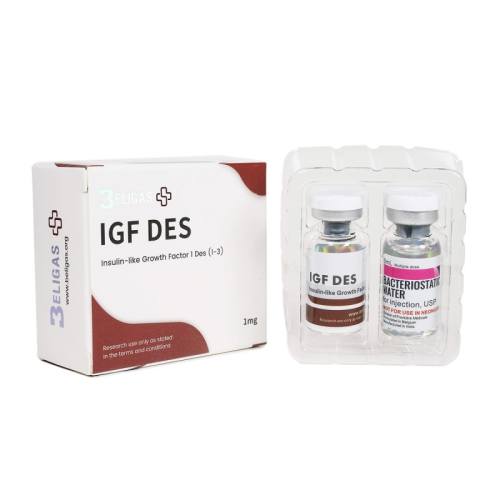CLASSIFICATION
Polypeptide Hormone
ACNE
No
WATER RETENTION
No
HBR
No
HEPATOTOXICITY
No
AROMATIZATION
No
MANUFACTURER
Beligas
WAREHOUSE
International Warehouse 3
SUBSTANCE
IGF-1 DES
,
Insulin-like Growth Factor 1 (IGF-1), often referred to as Somatomedin C, is a hormone that shares a molecular structure with insulin. It plays a crucial role in promoting growth during childhood and exhibits anabolic effects in adults.
IGF-1 is one of several growth factors essential for normal human development, primarily produced by the liver but also synthesized in various tissues throughout the body.
The structure of IGF-1 consists of 70 amino acids, similar to insulin, with an A and B chain linked by disulfide bonds, along with a C peptide region consisting of 12 amino acids.
UsageIGF-1 aids in the normal growth and development of bones and tissues and has the capability to reduce blood glucose levels. It promotes the utilization of fat cells, leading to fat loss while simultaneously increasing lean body mass, effects highly sought after by athletes and bodybuilders. Elevated IGF-1 levels correspond to weight gain, which is attributed to the increase in lean body mass rather than fat accumulation.
IGF-1 is particularly popular in the bodybuilding community and among regular gym-goers, as it helps shorten recovery times and boosts energy during workouts.
IGF-1 injections are commonly administered to both adults and children who suffer from growth hormone deficiencies. For children experiencing delayed development, IGF-1 can provide essential amino acids, and it can supplement adults who are deficient.
Research indicates that the anabolic properties of IGF-1 may stem from its ability to inhibit protein breakdown and stimulate protein synthesis in skeletal muscle, potentially aiding in the healing of burns and other tissue abnormalities.
Mechanism of ActionIGF-1 is a naturally occurring hormone in human blood that primarily regulates the actions of growth hormone. Normal functions of IGF-1 and growth hormone encompass tissue and bone growth. IGF-1 is generated in various tissues in response to growth hormone present in the bloodstream.
IGF-1 supports overall growth throughout the body and has growth-stimulating effects on most cell types, including those in bone, cartilage, skeletal muscle, liver, kidney, nerve, skin, and lung. In conjunction with its insulin-like effects, IGF-1 also plays a role in regulating cellular DNA synthesis.
AdministrationIGF-1 is typically administered via subcutaneous injection to a soft area of the body, such as the abdomen, but can also be given intramuscularly.
Method of Administration:Before using IGF-1, ensure that you have a clean and sterile syringe.
For promoting lean muscle growth and fat loss:
Dosage Guidelines:IGF-1 should not be injected more than twice a day. A typical dosage cycle may last from 2 to 12 weeks. Children and adults prescribed IGF-1 for growth deficiencies should consult a healthcare provider for appropriate dosing.
Side EffectsThe side effects of IGF-1 can mirror those associated with other growth hormones, including abnormal tissue growth (acromegaly) and potential harm to the joints, liver, and heart. Possible side effects include joint and muscle pain, headaches, and nausea. Additionally, IGF-1 may lower blood glucose levels, posing a risk of hypoglycemia. Researchers also link IGF-1 with an elevated risk of certain cancers, including those of the lung, breast, colorectal area, and prostate.
Benefits
